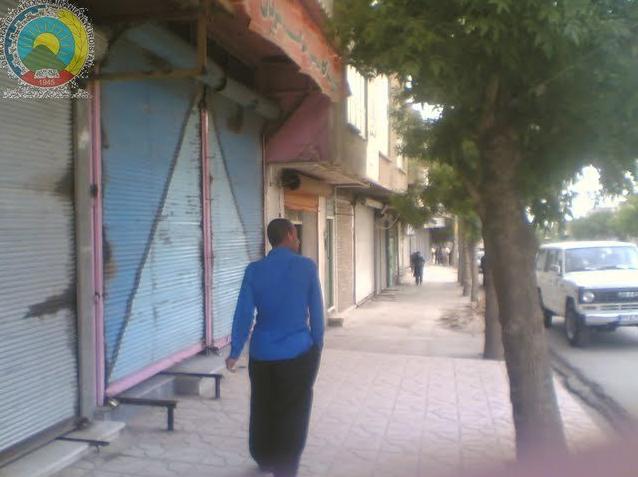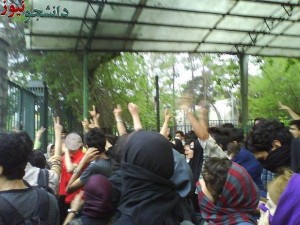The Latest from Iran (13 May): Justice, Legitimacy, and a Strike in Kurdistan
 Thursday, May 13, 2010 at 15:26
Thursday, May 13, 2010 at 15:26  2015 GMT: Kurdistan. ADN Kronos summarises, "Many shops, markets and public offices were closed in Kurdistan's main cities of Sanandaj, Saqqez, Kamiaran and Marivan. Most school and university students stayed away from school, according to the CyrusNews opposition website.
2015 GMT: Kurdistan. ADN Kronos summarises, "Many shops, markets and public offices were closed in Kurdistan's main cities of Sanandaj, Saqqez, Kamiaran and Marivan. Most school and university students stayed away from school, according to the CyrusNews opposition website.In Kamiaran, protesters gathered outside the home of Farzad Kamangar, one of five political prisoners executed on Sunday in Tehran's Evin prison."
2000 GMT: Iran and Iraq Troops Clash. From Agence France Presse:
Iraqi border guards exchanged fire with Iranian troops along the two countries' border on Thursday....
An Iraqi officer was captured by the Islamic Republic's forces in the 90-minute gunfight on the border with Iraq's autonomous Kurdish region, which was apparently sparked when Iranian troops mistook Iraqi soldiers for a Kurdish rebel group.
"Iranian forces thought that the border guards belonged to PJAK (the Party of Free Life of Kurdistan -- an Iranian Kurdish rebel group) and started to open fire," Brigadier General Ahmed Gharib Diskara, the head of Iraq's border guards in Sulaimaniyah province, told reporters.
"The border guards shot back and one officer of the Iraqi army has been captured. Negotiations are ongoing to free him."
NEW Latest Iran Video: Strike in Kurdistan (13 May)
NEW Iran Special: Executions, Politics, and the Attack on Nazila Fathi and The New York Times
NEW Iran Transcript: Mousavi “Do Iranian Mothers Have Rights?” (12 May)
NEW Iran Document: A Letter from Majid Tavakoli About the Executed (11 May)
Iran Update: The Aftermath of the Executions
Iran Document: Maziar Bahari’s Response to His 13-Year (and 74-Lash) Sentence
Iran Special: A Renewal of Protest for 12 June?
The Latest from Iran (12 May): Defending the Indefencible
1945 GMT: Kurdistan. Report --- Ajlal Aghvami, the spokesman of the Kurdistan Human Rights Organization, has been arrested in Sanandaj.
1540 GMT: Last Words from the Executed? Peyke Iran has posted what it claims is the last statement of Mehdi Eslamian, executed on Sunday, and footage from inside Gohardahst Prison in Karaj.
[youtube]http://www.youtube.com/watch?v=Rv92USld_rY&feature=player_embedded[/youtube]
1535 GMT: Investigation Complete? Mohammad Hassan Abutorabi-Fard, the Deputy Speaker of Parliament, has claimed that a report has been completed on last June's attack on Tehran University dormitories. Reformist members of Parliament had claimed that the supposed enquiry into the events had been set aside.
1525 GMT: Meanwhile...Where's Mahmoud? Khabar Online has pictures of President Ahmadinejad's visit to Yasuj in southwestern Iran, including a poster, "Sir, where is the gas you promised to the village of Kalous?"
And the President's message? "Be sure, Iran's next government will be 10 times more revolutionary....People all over the world, even USA and Europe, are disappointed by their leaders:their only hope is Iran! We should prepare the world for the arrival of the Mahdi."
1515 GMT: Kurdistan (Containing the Students). In addition to the 15 Kurdish student activists reportedly arrested in Marivan (five names have been published), Peyke Iran claims seven Kurdish students have been summoned to Evin court.
1500 GMT: The Kurdistan Strike. We are now featuring videos apparently showing widespread closure of shops and empty streets in cities in Iranian Kurdistan.
The strike was called for by the Kurdish Communist Party, the Democratic Party of Kurdistan, and Komeleh, including its Socialist branch.
BBC Persian have now posted a brief item on the events.
1455 GMT: A Rights-First Approach. Writing in The Washington Post, Roxana Saberi, who was detained in Iran from late January until early April 2009, begins with this story:
I received an e-mail from a human rights campaigner in Tehran who knew one of them, asking me to spread the word about the hangings. "We are truly helpless," she wrote, "and we feel lost."
Saberi argues:
As the international community focuses on Iran's nuclear program, it should also make human rights a first-tier issue. When the U.N. Human Rights Council meets in Geneva next month, Washington and the European Union should lead calls for a resolution setting up a mechanism to investigate human rights atrocities in Iran during the past year. A bigger push should be made to send a U.N. special envoy on human rights to Iran and to aid Iranians, including the many journalists forced to flee their country out of fear of persecution.
But perhaps even more important than government efforts is the outcry of ordinary people worldwide. When everyday citizens speak out against Iran's human rights violations, Tehran has a tougher time asserting that their calls have been masterminded by foreign governments.
1045 GMT: Kurdistan. An EA correspondent writes:
The point worth noting is the discipline and strong support evidently commanded by the Democratic Party within the population. The appeal for the strike was made over Kurdish satellite TV, and in contrast to the response of Iranian counterparts to calls for national strikes, the people of Sanandaj were immediately receptive. The photos have prompted congratulatory messages from people in Tehran, who commented on the efficacy of strike action in Iranian Kurdistan, as opposed to getting anything done elsewhere in the country.
1040 GMT: The Oil Squeeze. Financial Times Deutschland reports that Iran is having problems finding buyers for its oil, with supplies sitting on tankers.
1035 GMT: Kurdistan. Peyke Iran is claiming a heavy security presence and authorities' pressure on shopkeepers to reopen their shops in Sanandaj. The website claims that
two protesters were shot and injured in Sanandaj and that there have been clashes. Most Kurdish pupils and students reportedly did not show up at classes today.
1020 GMT: Streets are reportedly deserted in Sanandaj, Iranian Kurdistan's largest city.

1000 GMT: The Strike in Kurdistan. For three days, I have been following Internet chatter that there would be a general strike in Iranian Kurdistan, protesting the executions. However, as I could not hard evidence, apart from a statement from a Kurdish Communist Party (apologies to readers if I missed information), I held back on reporting.
Now, however, photos have emerged indicating that some shops are closed today. There are also claimed photos of clashes; we are trying to confirm.


0945 GMT: Apologies for limited updates. I have been occupied with writing an analysis, "Executions, Politics, and the Attack on Nazila Fathi and The New York Times".
0700 GMT: The Executions --- The Official Account. Yesterday we posted, without comment or criticism, Fars News' "further update" on Sunday's execution of five Iranians. This was based on the official statement of the public relations office of Tehran’s General and Revolutionary Public Prosecutor’s Office.
Having allowed time for readers to consider that account, we now have the queries of an EA correspondent over the failure to establish a justification for the executions, offer a credible defense that due process was indeed followed, or explain the timing:
1. Only four of the five are identified as members of the Kurdish separatist movement PJAK. One defendant was executed for a bombing in Shiraz although no claim is made that he was involved in the bombing and no evidence is offered that he knew about the intent to bomb before the operation. It is stated, based on the accused's confession, that he learned about the bombing after he became suspicious of a friend and persuaded that friend to admit that he was involved in the bombing. He then helped the friend flee.
2. The cases of two of the executed were never sent to the Supreme Court for final decision. The executions were performed with mere confirmation of the Appeals Court.
3. The Supreme Court decision to confirm the execution order of the other three was apparently rendered on 1 March 2009 after an Appeals Court decision that was rendered in February 2008. The delay in executions until May 2010 is not explained.
4. The evidence given in the statement regarding the PJAK membership of four accused is at best circumstantial.
The evidence given for Farzad Kamangar's membership in PJAK is that his brother was active in "party activities" in Sulaymanieh and has a "conviction record" for involvement with the PKK, the Kurdish movement active across Iran, Iran, and Iraq. The statement does not say if the record is in Iran, Iraq, or Turkey and does not explain why this blood relationship is significant in relation to alleged crimes.
The other evidence given for Kamangar's membership are the words of the other two executed men --- one of whom himself is alleged to be PJAK because of a coded note and PJAK booklet found in his house --- that they knew Kamangar, lived in the same neighborhood, and forged documents for him. They do not accuse Kamangar of being a member of PJAK and the statement does not say that they themselves admitted being members of PJAK.
If the Prosecutor's statement is accepted at face value, Kamangar was never involved in the actual bombing. Allegedly an explosive timer was found in his house and he was also accused of fabricating documents for two people, who intended to put together material for explosives found by police in a car.
0620 GMT: The Oil Squeeze. Kalemeh reports on the significant number of foreign companies who have suspended development of the South Pars and Assalouyieh oil and gas fields.
In recent weeks Iranian officials have issued "ultimata" to Royal Dutch Shell and Spain's Repsol to resume development or face eviction from Iran.
0615 GMT: The Executions. The Iranian Writers' Association has condemned the hanging of five Iranians on Sunday: "There are no words which could describe this bloodshed and bloodthirst"
0520 GMT: We begin this morning with two features. We have posted a letter from student activist Majid Tavakoli, detained in Evin Prison since 7 December, about three of the Iranians executed on Sunday. And we have put up the English translation of Mir Hossein Mousavi's wide-ranging comments on Tuesday about the Green Movement and the legitimacy of an unjust Government, "Do Iranian Mothers Have Rights?"
 ADN Kronos,
ADN Kronos,  Agence France Presse,
Agence France Presse,  Ahmed Gharib Diskara,
Ahmed Gharib Diskara,  Ajlal Aghvami,
Ajlal Aghvami,  BBC Persian,
BBC Persian,  CyrusNews,
CyrusNews,  Fars News,
Fars News,  Farzad Kamangar,
Farzad Kamangar,  Financial Times Deutschland,
Financial Times Deutschland,  Gohardasht Prison,
Gohardasht Prison,  Green Movement,
Green Movement,  Iran,
Iran,  Iran Elections 2009,
Iran Elections 2009,  Iranian Kurdistan,
Iranian Kurdistan,  Iranian Writers Association,
Iranian Writers Association,  Kalemeh,
Kalemeh,  Khabar Online,
Khabar Online,  Mahmoud Ahmadinejad,
Mahmoud Ahmadinejad,  Majid Tavakoli,
Majid Tavakoli,  Mehdi Eslamian,
Mehdi Eslamian,  Mir Hossein Mousavi,
Mir Hossein Mousavi,  Mohammad Hassan Abutorabi Fard,
Mohammad Hassan Abutorabi Fard,  Nazila Fathi,
Nazila Fathi,  New York Times,
New York Times,  PJAK,
PJAK,  Peyke Iran,
Peyke Iran,  Repsol,
Repsol,  Roxana Saberi,
Roxana Saberi,  Royal Dutch Shell,
Royal Dutch Shell,  Washington Post in
Washington Post in  Middle East & Iran
Middle East & Iran 

